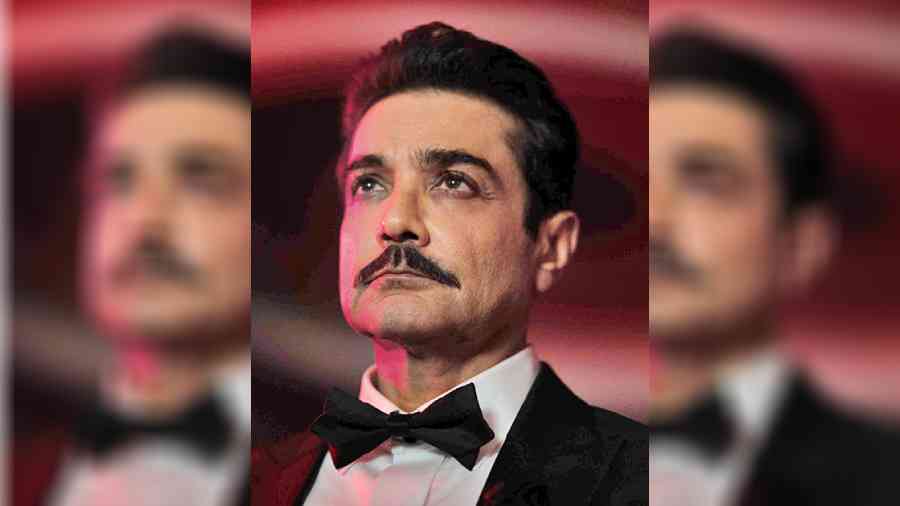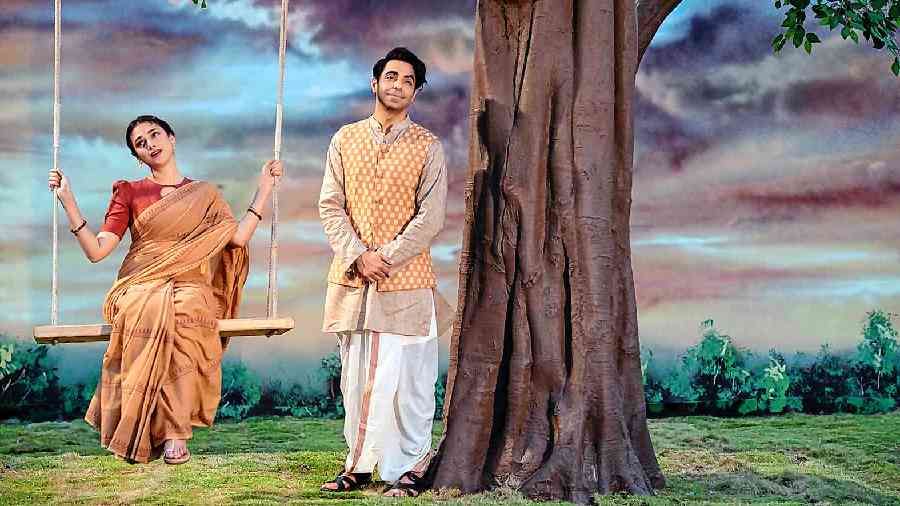The Golden Age of Hindi Cinema — spanning the ’50s and ’60s — comes alive in the series Jubilee, which drops on Prime Video today. Created and directed by Vikramaditya Motwane, the man behind films as diverse as Lootera, Udaan and Bhavesh Joshi: Superhero, Jubilee captures the action and emotion, both on-screen and off, of the era and is powered by a strong ensemble cast.
The Telegraph caught up for a chat with director Vikramaditya Motwane and actors Prosenjit Chatterjee (who makes his OTT debut), Aditi Rao Hydari, Aparshakti Khurana and Sidhant Gupta to know more about Jubilee.
Vikram, what was the genesis of Jubilee?
Vikramaditya Motwane: The short answer is alcohol! (Laughs) Let me come to the long answer now. I started assisting (as an assistant director) when I was 20-21, and I was this wide-eyed young man walking into the world of movies and everywhere one looked there was a frame, there was beauty and something so unique. So I think that led to this affinity of telling stories around the movies.
And then when you meet like-minded people who have the same affinity as you, it gathers a certain amount of momentum. The next thing you know, you are sitting on a script and people are willing to back your vision. So you just jump in and do it.
You make it sound very easy, but it never is, right?
Vikram: Not at all. Writing anything is never easy. But it is delightful, and this whole process of doing Jubilee, especially, has been amazing. I wouldn’t exchange it for anything else. It’s taken its own sweet time, every part of it has been written with a lot of love, and every day of shooting has been with a lot of love and effort. It’s not been easy, but it’s been a delight every single day.
For all the actors, did working on Jubilee — in terms of story, scale and role — present an experience that you haven’t had on any other project before?
Sidhant Gupta: The era, of course. This whole series feels very timeless. It has characters, clothes, sets, that world, that detailing, those emotions, those interactions that actually felt like interactions.... The best thing was that in the middle of a dialogue you don’t get a phone call saying, ‘Wahaan aa jao’ (everyone laughs). You are really present and in the moment....Prosenjit: Working for so many years, I have played so many characters. I really love my character of Srikant Roy in Jubilee because, as has just been mentioned, it’s a completely different world. We are trying to pay tribute to that era at some level. Srikant Roy is a fascinating character, a very, very strong character.
I love working with new-age directors and Vikram is one of my most favourite young film-makers. I really didn’t want to miss this chance. This is my OTT debut and Jubilee is the best possible show I could start with.
Aparshakti Khurana: If I compare my character Binod Das to the characters I have played so far, what is remarkable is that Binod has a very well-defined and remarkable equation with all the other characters on the show. Be it Roy Babu (Srikant Roy) or Sumitra ji (played by Aditi Rao Hydari) or Jai Khanna (Sidhanth Gupta) or Neelu (Wamiqa Gabbi) or with his wife Ratna (Shweta Basu Prasad). Before Jubilee, I hadn’t had the opportunity to play a character like this before. Samay lagaa for a character like this to come my way, but the wait was worth it. Binod Das has a remarkable graph.
Honestly, even after everything, I don’t really know if I deserve to be on Vikram sir’s set (smiles). I will be very honest, I am sure there are many actors who are far more hardworking than me. The amateur theatre group that I worked with in Delhi comprised 30-32 characters, and in terms of calibre, I would perhaps be placed 30th. I am not playing the humble card here. I am someone who has his reality checks in place. Life throws up opportunities and situations depending on where you are and at what time. The fact that I have got this opportunity doesn’t make me a better actor than everyone else out there, be it the seniors in my theatre group or peers in the industry. It was very situational that I got to meet sir (Motwane) and I got to audition for this show at that very point, the energies got together and this show happened for me.
Apar, what you just said reminded me of Zoya Akhtar’s Luck By Chance, a film that talks as much about luck and being at the right place at the right time as it does about effort and diligence, to get a toehold in the industry....
Aparshakti: Absolutely! This business is all about being at the right place at the right time. It is also about giving in your best and performing correctly in the moment, which is also true for any kind of sport. I normally don’t use the word ‘luck’ because it is a very heavy word and it tends to overpower one’s passion, perseverance and hard work. Luck and being at the right place at the right may more or less mean the same thing, but I mostly use the word ‘blessed’ to describe my journey so far.
Aditi Rao Hydari: I was dying to work with Vikram sir and I got this opportunity. I found the knowing and the unknowing of this girl (Sumitra) very interesting. I have played an actress in a Telugu film (Sammohanam) before. But Sumitra in Jubilee is a whole different being. Playing an actress in the Golden Age of Hindi cinema offered me a peek into the inner worlds of actors of that time... how guarded they were, which was brought on either by themselves or the people around them.
Making my character’s dualities believable, honest and true was a real challenge. She’s very badass and gutsy and I was very amazed that Vikram sir even thought of me for the role and to get into the head and heart of a human like this.
At the same time, her vulnerability is also a big part of who she is and perhaps it was my own attempt at security and familiarity that made me make that part of her also very, very important. Even when she is making somebody feel uncomfortable, I looked at it as childlike, the kind of fun you get out of making someone really uncomfortable (laughs).
I found her duality challenging but also exciting. Honestly, it’s all in the writing and the freedom that was given to us and the clear vision that it came with. This was a very unique and distinctive experience for me.
Vikram, have anecdotally any of the off-screen stories of that period of Hindi cinema made their way into Jubilee?
Vikram: There are Easter eggs everywhere in the show. We also have tributes and homages paid to pretty much everybody. We hark back to that period throughout the show, whether it is through dialogue or action or music. But we haven’t taken any pains to point out specifically that this is a tribute to so and so....
The references and homages are not anecdotal, but the Easter eggs are basically Atul (Sabharwal, who has written the screenplay) and my way of giving a little hat-tip and saying a little ‘thank you’ to all those who have come before us.
What went into building this fascinating world set in a fascinating time?
Vikram: It can be a very insular world. Those in the business of film-making like us know that world, we know the inside jokes and the stories, and so the biggest challenge for us in this show was to take this world and present it to a viewer who might know nothing about that era and how the movies work. And so the biggest question for us was, ‘How do we make it compelling and interesting and dramatic?’ That balancing act in the writing process was a challenge. Every day at the shoot was a challenge because it’s always time vs money and that doesn’t change. A director always needs more time and there is never enough money (smiles).
In our case, the biggest challenge was to ensure that we made a dramatic show. The key here was to say that let’s create compelling characters with very interesting arcs from the beginning. Characters that you invest in, believe in, that you want to see succeed or fail or even get punched... but at least, there is a high emotion that you are investing yourself in. That it happens to be set in the world of the movies is a bonus.

Prosenjit, your father Biswajit worked during that age of Hindi cinema. Do you have any memories of visiting the sets of his films? Even you made your debut as a child actor with the 1968 film Chotto Jigyasa, starring your father....
Prosenjit: Yes, I do have memories. My father started in 1959-60 and his first Hindi film was Bees Saal Baad (1962). I used to visit studios with him. I did Chotto Jigyasa when I was five-and-a-half. I was telling Vikram that I shot at that time using back-projection technology, and we had the same technology in Jubilee.
I have seen movie-making in that era, visiting studios in Calcutta, Chennai, Bombay.... I have seen make-up rooms and how they operated. Even the lifestyle of the actors was different. Today, actors are more professional and adaptive to change.
But the making of cinema has remained the same everywhere and in every decade. Only technology has changed. The fundamentals of storytelling are the same.
For all of you, is there a specific film that represents that age of movie-making in Hindi cinema?
Aditi: The song Chaudhvin Ka Chand (from Chaudhvin Ka Chand)....
Aparshakti: Every (Mohd) Rafi saab song tugs at so many heartstrings...Aditi: And the way all these songs were shot... the lights, the set, the backlit hair....
Prosenjit: When I watched Kaagaz Ke Phool, I was blown away. And when I came on the sets of Jubilee, there were some shots that took me back to that film. We have a scene inside a movie theatre and I clicked a photo of that because it was so beautiful... a strip of light coming in like it was in Kaagaz Ke Phool.Vikram: As a child, the first black-and-white film I remember watching was Chalti Ka Naam Gaadi (1958). It was made for family viewing and had great music and I became a Kishore Kumar fan very, very early. Also, for me, Pyaasa is probably the greatest Hindi film ever made.
Sidhant: I haven’t watched too many black-and-white films. The first one I watched was Awara (1951) because he (Vikram) asked me to watch a few films of that era before I got into Jubilee. It’s amazing that the black-and-white era is called the golden era.
Aparshakti: Our daadi used to pull all of us as kids together and make us watch Waqt (1965) and we all cried copiously every time. And my dad made us watch Jaane Bhi Do Yaaro. It’s one film that can really sum up my childhood.











